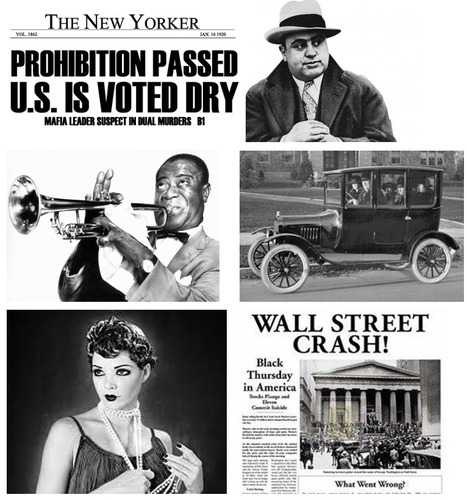Is it truly a bad thing if certain history repeats itself? For instance, comparing the current Panoramic decade to the 1920s, would it be beneficial or chaotic if our behavior turned out to be the same? Along with developing a collection of masks to coordinate with my outfits, I have been wondering if there is any correlation between these two decades. This lead me to discover what different parts of the world were experiencing in the 1920s and if any of that compares to how we all will maneuver this decade.
Let’s start with the 1920s in the US. The jazz age. The Great Gatsby. The delicate clash between glamour and rebel. During this time, there was a dramatic rise in consumerism. Film and literature hyped up the parties and lifestyle a portion of the population was experiencing. On the other hand, the US was clamping down on immigration through legislation. The stock market began its descent. Henry Ford introduced the 49 hour work week with the auto industry. The younger generations of the time were pushing back against traditional taboos. Overall, it seems as if the 1920s in the US was a vibe.
In contrast, the 1920s in Ghana had a different vibe. During this time, the Gold Coast was still exporting gold and producing more than half of the world’s supply of cocoa. Due to this continued wealth, the 1920s was a decade of industrial and economic development in Ghana under the orders of Governor Gordon Guggisberg. He took on a 10-year development program and proceeded to develop and improve transportation, water supply, drainage, hydroelectric projects, public buildings, schools, hospitals, prisons, and communication lines. Their set goal was to fill half of the colony’s technical positions with Africans as soon as they could be trained. It seems that to an extent Ghanaians did benefit from the developments in this decade, which also aligned with growing resistance against British rule over Ghana.
Next, in Brazil, a similar resistance was happening. The 1920s in Brazil was partly defined by a modern art movement. As Brazil celebrated 100 years of independence from Portugal, artists began to produce avant-garde artwork that focused on human naturalism and anatomy. Of course, at first, the general response was a mixture of horror and shock. However, there was a desire to rid Brazil of imported art, literature, ideas, and ideology to push back against European art being seen as superior to Brazilian art. Also, fun fact, in the 1920s, many small towns in Brazil educated children in German or Japanese and Portuguese was rarely spoken. This was due to the mass migration to Brazil from Europe and Asia in the 1890s. However, when it was disclosed that the German government was aiding anti-government groups in Brazil, the Brazilian authorities closed schools that did not teach primarily in Portuguese.
Are you starting to notice a pattern? Surrounding resistance, identity, and drama? Let’s add one more.
This pattern was also happening in Japan. In the 1920s, a form of nationalism took hold in Japan to preserve traditional Japanese culture and reject Western influence. The British Empire ended its 21-year “alliance” with Japan, signaling the West’s apprehension of Japan’s growing power in East Asia. However, many Japanese who lived in the cities watched Hollywood movies, enjoyed Western-style dancing, and found Baseball, golf, and tennis popular. They also appreciated Western examples of democracy, liberal institutions, labor unions, and Women’s rights and proceeded to implement a version of these ideologies that worked for them at the time.
Looking at this sample of the world, the 1920s was a decade of resisting the traditional, redefining and reprioritizing identity, and experiencing an overwhelming amount of drama. The West was fighting among themselves, while countries colonized or hijacked by the West were starting to shake the table. All while everyone was wearing similar fashion styles and listening to similar music.
Now, fast forward to today. The first year of the 2020s was defined by resisting a virus and the traditional forms of basically everything, redefining identity and equality, and experiencing a devastating amount of drama. This time, it was overwhelmingly documented. So, what will the 2020s decade look like? What can we learn from the 1920s?
I’m glad you asked. I don’t know. Got ya! Ok, I have some ideas. The added layer to this experience is the technology and a global virus. Countries had to turn inward, after spending years getting comfortable with the good and bad side of globalization. People found creative ways to collaborate across borders and produce locally. Even I got to work with and get involved with groups of people I would have never crossed paths with if it was not for this push for community online. I feel it is also due to this turning inward that there was an increase in holding the failings of traditional norms accountable. The question is, how will this decade resolve all the issues we learned about and protested against in 2020? We all did a lot of talking while we had to stay in place or stay at home. Now that movement is becoming the norm again, we need to walk the walk too.
Despite all the varying and confusing information about The vaccine, I feel we still need to applaud humans on Earth. You made history! Developing a vaccine and rolling out distribution all in one year. That is awesome. Now, of course, me being someone who has no B.S. behind my name, (get it? Because I did not study science, but we should always question rules too) I must ask why it is taking so long to develop a malaria vaccine when a large part of Africa and Asia are heavily affected by it. Hopefully, we can get on that next.
From an individual standpoint, mental health is the bigger conversation that might shine during this decade. Again, thanks to technology and the people who are brave enough to share their authenticity, access to a community, resources, and solutions are expanding in ways like never before. The way this progresses will have such a major impact on everyone as a whole. Mental health is not only about what is happening in your mind. Cultures around work, relationships, health, consumerism, education, authority, and society at large are all influenced by mental health.
I feel we have set ourselves up for quite a fascinating decade. I am grateful to see beyond the year of doom. I feel more aligned with who I am and more comfortable in how I choose to create my reality. As calm and cool as that might be, I also deeply feel the continued unnecessary suffering the world and my mind still face. It is such a surreal balance because it keeps me very present at the moment. Looking at what was going on in the 1920s and how that influenced decades later, it seems like we are right on time in how we are defining the 2020s.

What do you think? I hope you have been keeping safe. Share your thoughts with me. Also, remember to connect with me on YouTube, Instagram, Pinterest, Twitter, and/or Facebook. I love hearing from you. As wonderful as the internet is, being online still gives me this surreal isolated / connected feeling. You know what else is funny? In January of 2020 I posted a short story called The Year 2020. At the time, I had no idea how the year was going to be, but the story has some foreshadowing. It is fascinating how the imagination works.
Also, this mix is officially part of my 2020s soundtrack. Wouldn’t it be cool to chill at a lounge or picnic with this vibe? Enjoy.
Take care.






Leave a comment